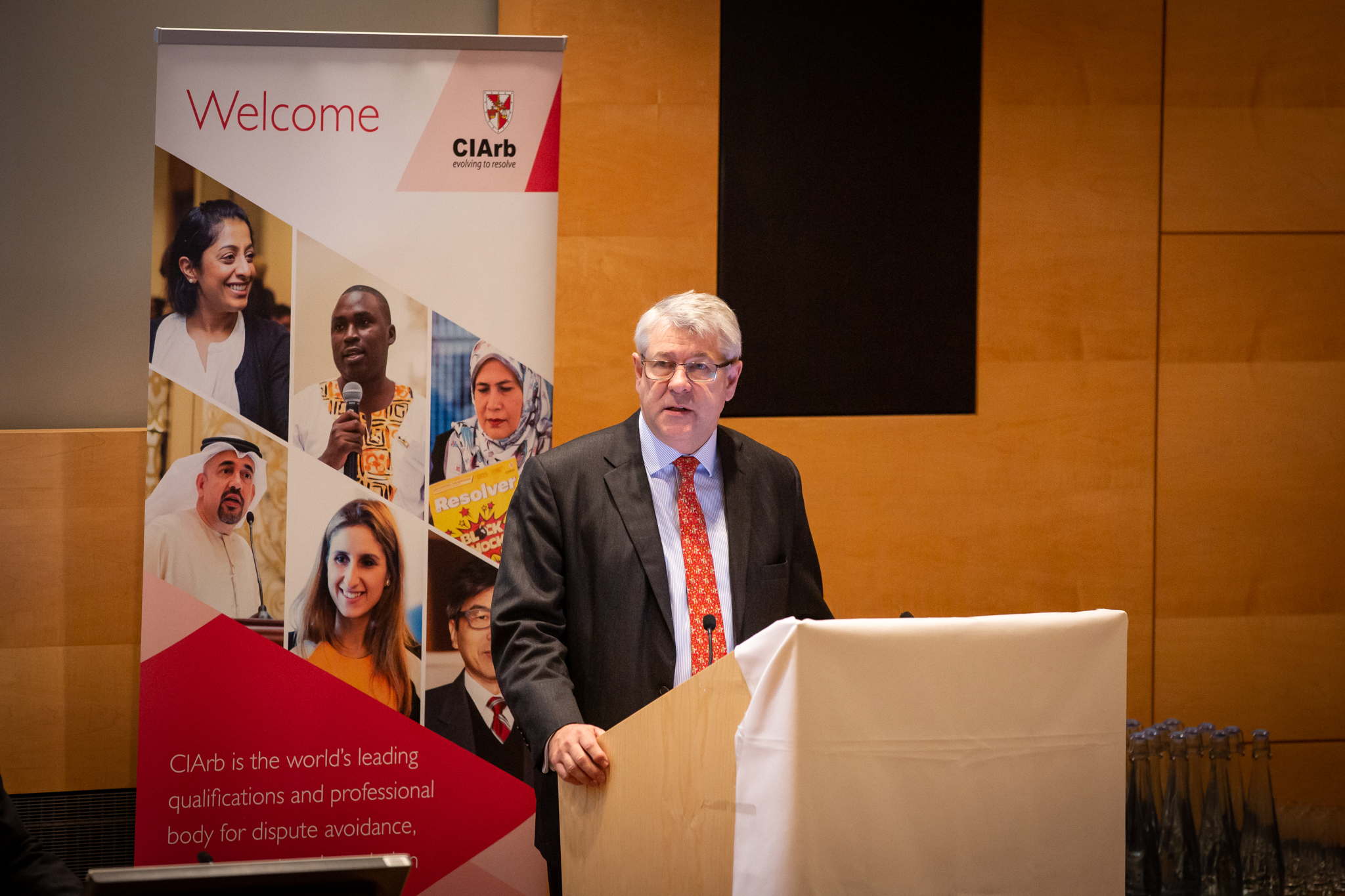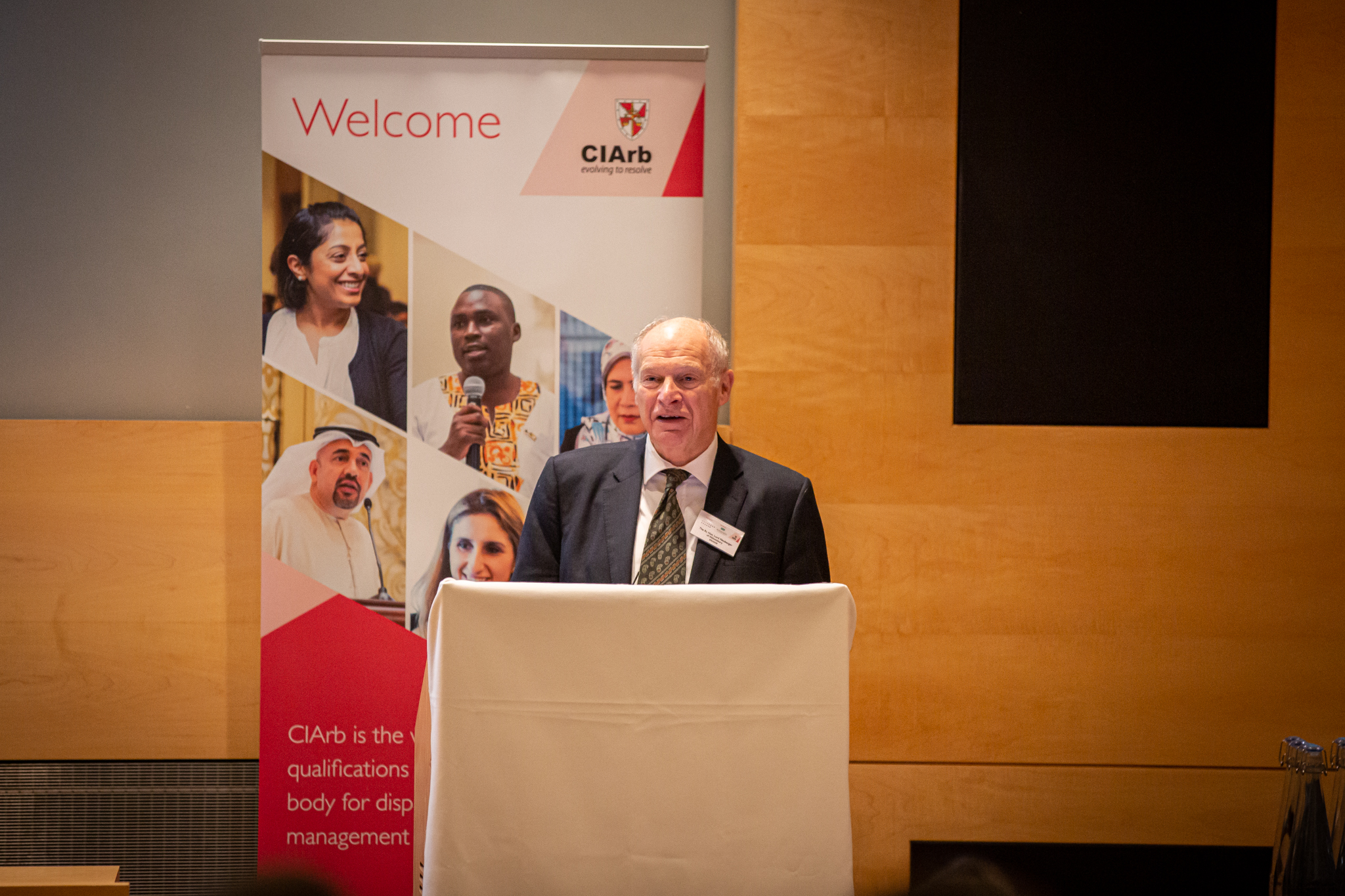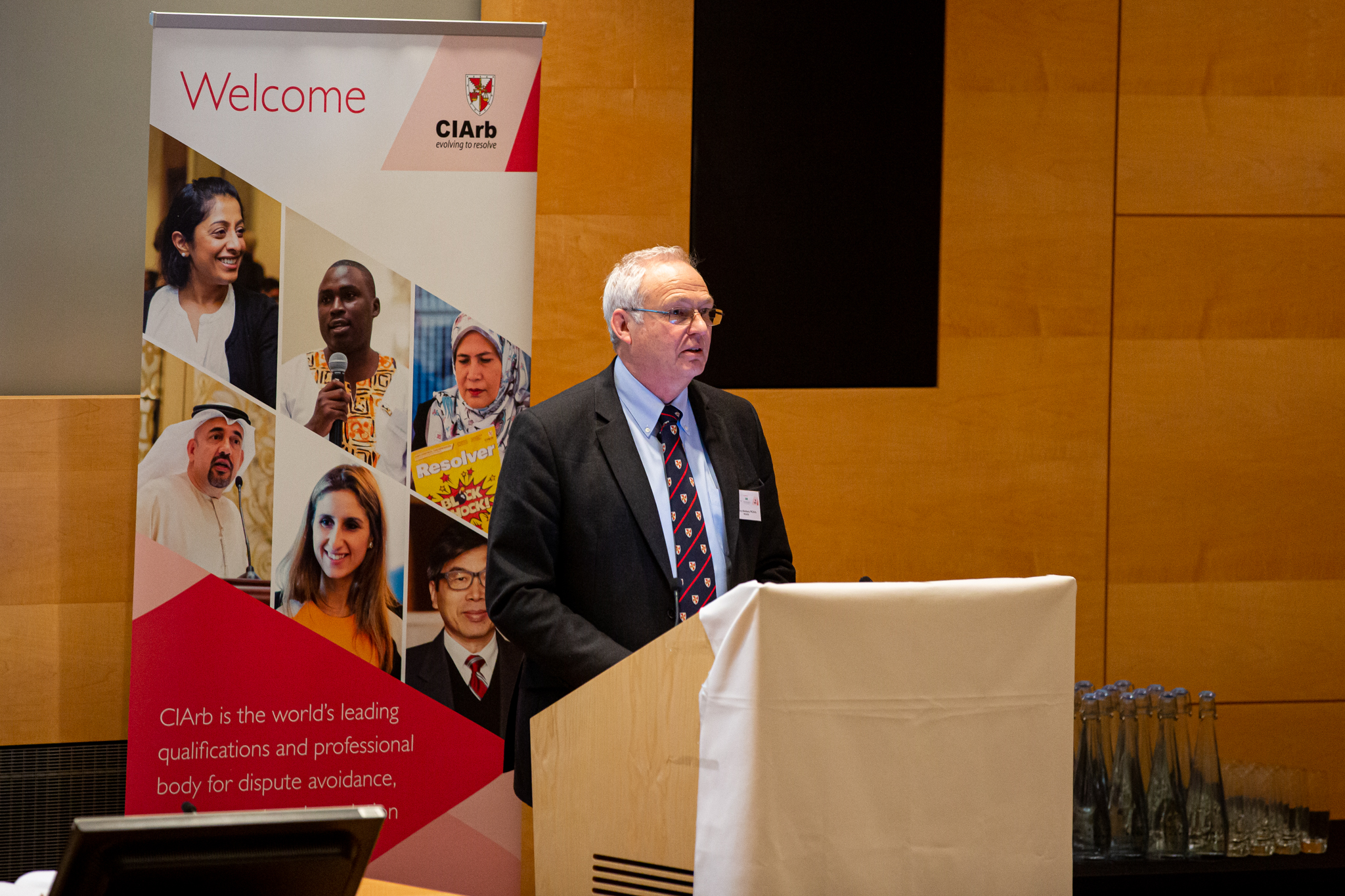CIArb News
Dispute Appointment Service (DAS) Convention 2019
29 Nov 2019
The 2019 DAS Convention opened with introductory remarks from Audley Sheppard QC FCIArb, on behalf of the hosts Clifford Chance. Audley discussed the relevance of the day’s topics from his dual perspective as practitioner and Chair of the LCIA Board, and the importance of such practical discussions. CIArb Director General Anthony Abrahams MCIArb then proceeded with the welcome address, thanking Clifford Chance for kindly hosting the day’s event. The Director General introduced the keynote speaker, referencing the longstanding friendship between CIArb and Lord Neuberger.
 Audley Sheppard QC FCIArb
Audley Sheppard QC FCIArb
The Rt. Hon. Lord Neuberger of Abbotsbury, former President of the UK Supreme Court, gave the keynote address. Lord Neuberger’s speech reflected upon the relationship between the judiciary and arbitration, which he defined as “slightly schizophrenic”. On one hand, judges approved of arbitration for three primary reasons: firstly, as an aspect of their support for consensual means of resolving disputes; secondly, due to their fundamental principle of supporting contracts; and thirdly due to arbitration lessening the current pressures on the courts. However, Lord Neuberger argued, judges can at times feel their status undermined by arbitrators. At times judges in national courts can feel diminished, with their views effectively overruled by tribunals. Lord Neuberger then turned to the recent Achmea decision of the European Court of Justice, in which he considered the argument to be “thin to the extreme” with “sparse” reasoning. Despite considering the ECJ’s judgement to be “one of its less impressive”, Lord Neuberger did however conclude that it would ultimately have to be lived with, and practitioners would have to adapt to events. Alongside ISDS, Lord Neuberger considered mediation to be the one of the areas that had experienced the greatest developments over his period as a judge. The unprecedented growth of mediation over the last few decades reflected its many attractive features, and it was a comment on the human species that such a clearly beneficial process would need to be developed. Costs, Lord Neuberger felt, were an area where more remained to be done. Third Party Funding has been one consequence, which while having unattractive aspects should generally be supported for reasons of access to justice. Turning finally to the position of the UK as a centre for international dispute resolution, Lord Neuberger concluded that perceptions could prove a problem, and it was important for UK practitioners to send a message internationally.
 The Rt. Hon. Lord Neuberger of Abbotsbury
The Rt. Hon. Lord Neuberger of Abbotsbury
The first panel session then began with an introduction from the Chair, Nicholas Gould FCIArb, who discussed how ADR could be categorised under three pillars. Nicholas also highlighted the CIArb Dispute Board Rules before introducing the panel. Philip Harris FCIArb spoke first, on the topic of adjudication as a UK success story that has been exported worldwide, with greater potential to outside of the construction industry. Why, he asked, have lawyers been slow to evangelise the process? Philip called for an Adjudication Act, modelled on the 1996 Arbitration Act, to support the expansion of statutory adjudication across further sectors.
Andrew Aglionby FCIArb spoke next on the issue of document-only procedures, and how different jurisdictions have led the way on minimising the use of witness evidence. Current studies have shown witness evidence to be deeply imperfect, and in some countries there is a cultural distrust of the process. Could document-only procedures prove the future for more efficient ADR processes? Ned Beale FCIArb discussed the specialist Financial Tribunal Scheme that he has been working on with CIArb and the All-Party Parliamentary Group for Fair Business Banking (which as yet has not been enacted). The scheme aims to address issues of cultural problems in the banking sector, as well as how courts struggle to deal with mass claims. Arbitration, Ned concluded, has a specific role here for higher-value or more complex claims beyond the capacity of ombudsmen.
Finally, Paul Rose C.Arb FCIArb spoke on the Pubs Code Adjudicator Scheme, and the role of CIArb in appointments. Paul explained the functioning of the statutory scheme and how tied leases work in the sector, as well as how the costs regime used for the scheme ensures access to justice while discouraging vexatious claims. The scheme also allows parties to get a fair result without extensive legal representation.
The second panel session dealt broadly with states and their role in disputes and was ably chaired by Sarah Vasani. Catharine Titi began the conversation with a thought provoking analysis of states’ use of mediation and conciliation in investment disputes. She made the point that in terms of investment disputes, arbitration is a default rather that an alternative. However, conciliation processes such as mediation are gaining attention as many new BITs have included mediation procedures. However, challenges remain, such as issues of perception among governments that agreements to settle in meditation make them look weak and will invite a flood of frivolous claims.
Next, Ben Beaumont C.Arb FCIArb gave a concise opinion on the potential issue with states current proposal in UNCITRAL Working Group II to create expedited arbitration rules to supplement the current regular ad hoc rules. In his view the benefits to time and cost savings are clear. However, he cautioned that since the procedures are in the control of the parties and not the arbitrators, such a procedure may not actually be used widely by parties. James Clanchy FCIArb followed with an overview of the importance of maritime arbitration in practice in the broader commercial arbitration practice. By sheer volume and value of the claims, maritime arbitration dominates the commercial arbitration practice, particularly in London which is by far the most popular seat of maritime disputes. Because of the historical co-development of English contract law and shipping law, maritime arbitration seated in London has become a default global regulator in the shipping industry and wider commerce as well.
Alexis Foucard then gave a view of the issue of claims of corruption in arbitration through the lens of the recent Paris Court of Appeals analysis in the Alstom case. The court used a version of the “red flags” concept which is drawn from the US Foreign Corrupt Practices Act. A cumulation of these indicative behaviours were sufficient to taint the contract, in the court’s view. Enforcing a contract that was obtained through a corrupt process would be contrary to French public policy and refused to enforce. This analysis leads to the conclusion that express and overt corruption is not needed for courts to annul awards. Arbitrators thus should take note and be careful when they see such “red flags.”
Finally, Sarah Vasani gave her perspective on the use of mediation and conciliations. In her experience, the use of mediation by states has increased as third-party funders have taken a larger role in funding investment claims against them. This is due to the fact that third-party funders typically engage in extensive vetting and due diligence processes before agreeing to fund the claim. States’ concerns over appearing to accept liability if they settle in pre-dispute conciliation can be handled through the use of an expanded “cooling off” letter laying out the claims and evidence developed through a funding application. This can lead to a face to face conversation with state representatives, which in turn, can lead to mutually agreed guidelines for mediation. If done in a way that focuses on building trust, sharing information, maintaining strict confidentiality, and the benefits to both parties in settling early, these negotiated mediation processes can be highly successful with states.
The third panel’s speakers, moderated by Jessica Gladstone FCIArb, discussed ADR in combination with sovereign immunity of states, climate change and other issues of global importance and explored how international and domestic legislations can address them. Dr Lucas Bastin introduced some possible issues of sovereign immunity, which might arise when enforcement of awards against states or state entities is sought. Such issues are subject to differences in the regimes of enforcement. Dr Bastin compared approaches to enforcement covered in the New York and Washington Conventions and named certification (for instance, of the nature of a property or commercial purpose of a property) as the third issue, which, having an effect on the enforcement process, has recently become irrelevant for the awards under the 1996 Act and may in the near future become irrelevant with respect to awards under the 1966 Act.
“ADR, the State and consent” topic was explored by Dr Emilia Onyema FCIArb. She drew the audience’s attention to the understanding of consent. Whereas the consent to arbitration in itself, expressed in BITs, is not in doubt, the real concern is an often scarce level of participation of a state in a proceeding and whether it should have the right to not accept the outcome of the process once the award has been issued. This question is of a particular importance where challenge of an award might play a role in a state’s political affairs.
Marion Smith QC FCIArb concluded the third panel’s theme by making an emphasis on an alarming climate change topic, importance of arbitrators’ awareness about climate, aiming to use arbitration in a non-conventional manner and be able to adjust to the new world we are living in in order to preserve it. Climate change is, however, a new area of expertise, which requires specific, rare knowledge and therefore might result in a vulnerability of party and/or an arbitrator where experts’ opinion has to be relied on and viewed as a trusted source of information."
In the final session, the DAS' progress relating to new schemes and commitment to diversity and inclusion was highlighted in a speedfire style chat moderated by Kim Franklin QC C.Arb FCIArb of Crown Office Chambers. The discussion began with Philip Digby FCIArb, a recently qualified arbitrator, recounting his experience with the Shadowing Scheme. As a Chartered Surveyor by trade, Philip relished the opportunity to shadow the arbitral process in a complex construction case and highly recommends the experience to all aspiring practitioners. Donny Mackinnon C.Arb FCIArb, Chair of the Scotland Branch of CIArb also commended the importance of pupillage and encouraged those interested to attend events with CIArb. Donny also flashed the new initiatives being undertaken by the Scotland Branch to bring new voices to ADR. Championing the success of the Young Members’ Group in driving diversity for the branch, Donny highlighted the importance of the annual meeting to achieve this. Furthermore, the impact of specialised family mediation meetings was indicated as a positive attraction that encourages more women to become members of the branch. Gill Mansfield FCIArb, Barrister and Mediator emphasised the importance of bespoke schemes to encourage more businesses to seek mediation as a cost-effective alternative to other forms of ADR or litigation. Gill especially recommends the framework of specialist schemes for commercial and personal claims as legal representation is not required and more suitable for specific disputes. Anthony Abrahams MCIArb finally announced the slow but steady progression of diversity within the Panel membership and membership more widely thanks to the work of DAS to promote itself to new voices through events and commitment to the Arbitral Pledge.
 Anthony Abrahams MCIArb
Anthony Abrahams MCIArb
The second half of the session focused on the Business Arbitration Scheme (BAS). Chairing the discussion, Daniel Djanogly C.Arb FCIArb, Forensic Accountant, Expert Determiner and Chartered Arbitrator at CVR Global LLP, firstly introduced the new developments to the BAS with the assistance of Paul Rose C.Arb FCIArb who commented on the specific expression of the BAS within the London Branch where the branch works closely with DAS unlike in other regional branches to execute the Prodigy Finance scheme. Mohammed Haque FCIArb, Senior Claims and Contract Specialist at Thomas Sands Consulting Ltd and Chair of the Thames Valley Branch noted how successful the branch is at promoting diversity within its members. Tom Cadman ACIArb, Head of Governance and Legal Services at CIArb, and Kemi Ojutiku FCIArb, Barrister at 5 Pump Court both then rounded the discussion up with an overview of the BAS from the point of view of its legal director and of a Fellow looking for appointments. The Panel underlined the importance of the BAS and DAS more generally in promoting the rule of law through ADR and emphasising the role of CIArb in guiding disputes through the use of Rules, Guidance Notes and bespoke schemes. As ever, CIArb is evolving to resolve; and the promotion of the Business Arbitration Scheme (BAS) and continuing addition of Fellows to the Presidential Panels are evidences of DAS’ support of new voices in arbitration.
The day ended with a networking drinks reception, where CIArb presented the President Prize(s), Student of the Year Award and Fellows’ Graduation Ceremony.
DAS Convention 2019 is most grateful to its sponsors Clifford Chance LLP and Arbitralis.
Photos from the event is available here.
12 Apr 2024
Significant progress on Advisory Centre for International Investment Law at UNCITRALIn 2017, UNCITRAL Working Group III (WGIII) was launched and was tasked with working on procedural reform of the investor state dispute settlement (ISDS) system. From 1-5 April 2024, Ciarb participated in the 48th session of WGIII in its capacity as an observer delegate.
12 Apr 2024
A promising future: Strengthening mediation through diversityWe speak to mediator and Imam Ibrahim Hussain MCIArb about mediation’s bright future, and why diversity strengthens mediation.
12 Apr 2024
RIDW24: Construction Arbitration Trends and Key TakeawaysCristen Bauer, Ciarb's Head of Policy, highlights a few key takeaways from the discussions at Riyadh International Disputes Week 24 (RIDW24)